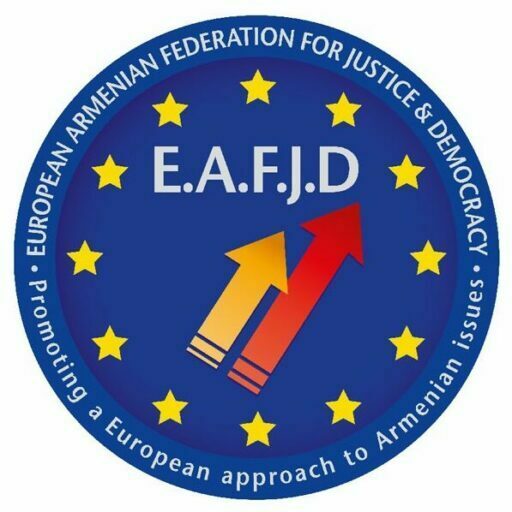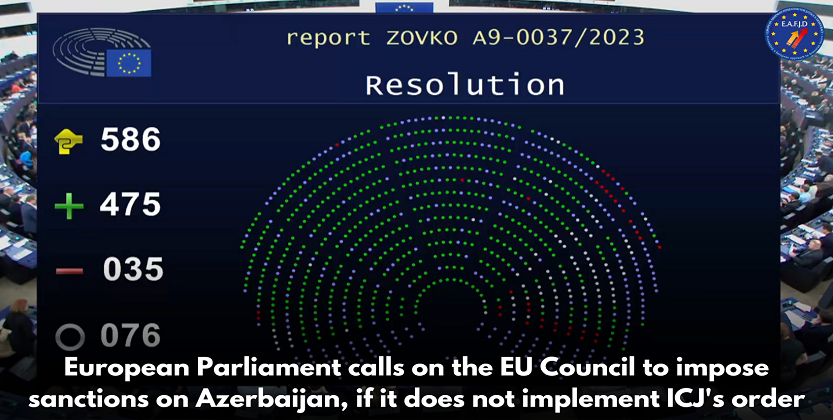Brussels, 15 March 2023 – Today the Plenary of the European Parliament (EP) adopted the reports on EU-Armenia and EU-Azerbaijan relations.
The reports focus on key points regarding the relations of the EU with Armenia and Azerbaijan, they also address the conflict in Nagorno Karabakh/ Artsakh and the role of the European Union in promoting stability and peace in the region.
Both reports reaffirm that a comprehensive peace treaty between Armenia and Azerbaijan must guarantee the integrity of the sovereign territory of Armenia, the rights and the security of the Armenian population residing in Nagorno-Karabakh. The EP emphasizes that, the Nagorno-Karabakh conflict requires a comprehensive political settlement in accordance with international law, including the principles enshrined in the UN Charter, the 1975 OSCE Helsinki Final Act, in particular the three principles of non-use of force, territorial integrity and self-determination, the OSCE Minsk Group’s 2009 Basic Principles.
The European Parliament welcomes the steps undertaken by the Armenian and Azerbaijani leaderships to achieve lasting and sustainable peace in the region, however at the same time denounces the behaviour of the Azerbaijani leaders undermining these efforts, in particular through explicit threats of further attacks, frequent border violations, territorial claims on so-called Western Azerbaijan, or the spread of hate speech against the Armenian population, especially in education.
In both reports the European Parliament condemns the military incursions by Azerbaijan into the sovereign territory of Armenia. The EU-Azerbaijan report mentions the subjection of numerous Armenian prisoners of war to physical abuse and acts of humiliation and torture by Azerbaijani forces against Armenian civilians.
In the report on Armenia the EP emphasizes that the root cause of the Nagorno Karabakh conflict, i.e. the status of the formerly autonomous region and the security of the Armenian population of Nagorno-Karabakh, remains unresolved.
Concerning the implementation of Article 9 of the 9 November 2020 ceasefire statement, the EP underlines in both reports that the unblocking of transport and communication links between the western regions of Azerbaijan and the Nakhichevan Autonomous Republic cannot infringe on the territorial integrity of Armenia.
The EP stresses Azerbaijan’s obligations under the ICJ order of 22 February 2023, which requires Azerbaijan to take all measures at its disposal to ensure unimpeded movement of persons, vehicles and cargo along the Lachin corridor in both directions. In this context the EP calls on the EU Council to impose sanctions against Azerbaijani government officials, if the ICJ’s order of 22 February is not immediately implemented.
It is important to note, that in the EU-Azerbaijan report the EU Parliamentarians regrets that the Memorandum of Understanding between the EU and Azerbaijan only focuses on energy cooperation and is not subject to any conditionality.
Furthermore, the EU Parliament condemns Turkey’s expansionist and destabilizing role in the South Caucasus, including through sending Syrian mercenaries to fight on the side of Azerbaijan in the Second Nagorno-Karabakh War in 2020. The EP calls on Turkey to play a constructive role in the region and to reconsider its unconditional support for Azerbaijan. Moreover, the EP calls on Turkey to take tangible steps towards normalizing relations with Armenia.
Finally, the EP urges both parties, but especially the Azerbaijani authorities to refrain from any hostile rhetoric or actions that may be perceived as inciting hatred or outright violence.
EAFJD’s president Kaspar Karampetian commented:
”The reports clearly condemn the Azerbaijani aggression against the Republic of Armenia and Azerbaijan’s incursions into the sovereign territory of Armenia. The EP also calls on the EU Council to impose sanctions on Azerbaijan, if it does not implement ICJ’s order to unblock the Lachin Corridor.
It is crucial that the report on Azerbaijan stresses, that the solution to the Nagorno Karabakh conflict must be in accordance with the international law, namely the 3 Basic Principles.Karampetian concluded, that the European Parliament’s position is important for the Armenian side, nonetheless it is the EU executive, that must take concrete measures against Azerbaijan while taking the EP’s position as a basis. The EAFJD will continue working vigorously in this direction.’3


